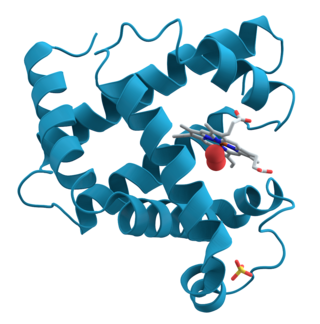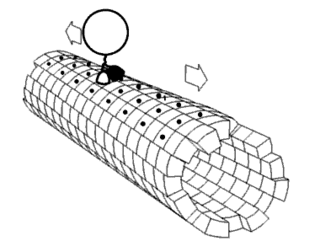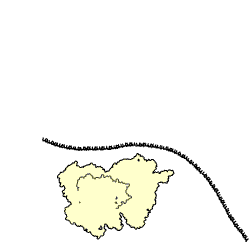Related Research Articles

Biochemistry or biological chemistry is the study of chemical processes within and relating to living organisms. A sub-discipline of both chemistry and biology, biochemistry may be divided into three fields: structural biology, enzymology, and metabolism. Over the last decades of the 20th century, biochemistry has become successful at explaining living processes through these three disciplines. Almost all areas of the life sciences are being uncovered and developed through biochemical methodology and research. Biochemistry focuses on understanding the chemical basis which allows biological molecules to give rise to the processes that occur within living cells and between cells, in turn relating greatly to the understanding of tissues and organs, as well as organism structure and function. Biochemistry is closely related to molecular biology, which is the study of the molecular mechanisms of biological phenomena.
The following outline is provided as an overview of and topical guide to chemistry:
Physical science is a branch of natural science that studies non-living systems, in contrast to life science. It in turn has many branches, each referred to as a "physical science", together called the "physical sciences".

Theoretical chemistry is the branch of chemistry which develops theoretical generalizations that are part of the theoretical arsenal of modern chemistry: for example, the concepts of chemical bonding, chemical reaction, valence, the surface of potential energy, molecular orbitals, orbital interactions, and molecule activation.

Biophysics is an interdisciplinary science that applies approaches and methods traditionally used in physics to study biological phenomena. Biophysics covers all scales of biological organization, from molecular to organismic and populations. Biophysical research shares significant overlap with biochemistry, molecular biology, physical chemistry, physiology, nanotechnology, bioengineering, computational biology, biomechanics, developmental biology and systems biology.

Food science is the basic science and applied science of food; its scope starts at overlap with agricultural science and nutritional science and leads through the scientific aspects of food safety and food processing, informing the development of food technology.
The following outline is provided as an overview of and topical guide to neuroscience:

Biochemists are scientists who are trained in biochemistry. They study chemical processes and chemical transformations in living organisms. Biochemists study DNA, proteins and cell parts. The word "biochemist" is a portmanteau of "biological chemist."

Medicinal or pharmaceutical chemistry is a scientific discipline at the intersection of chemistry and pharmacy involved with designing and developing pharmaceutical drugs. Medicinal chemistry involves the identification, synthesis and development of new chemical entities suitable for therapeutic use. It also includes the study of existing drugs, their biological properties, and their quantitative structure-activity relationships (QSAR).

The Max Planck Institute for Biophysical Chemistry, also known as the Karl-Friedrich Bonhoeffer Institute, was a research institute of the Max Planck Society, located in Göttingen, Germany. On January 1, 2022, the institute merged with the Max Planck Institute for Experimental Medicine in Göttingen to form the Max Planck Institute for Multidisciplinary Sciences.

A biologist is a scientist who conducts research in biology. Biologists are interested in studying life on Earth, whether it is an individual cell, a multicellular organism, or a community of interacting populations. They usually specialize in a particular branch of biology and have a specific research focus.

Molecular biophysics is a rapidly evolving interdisciplinary area of research that combines concepts in physics, chemistry, engineering, mathematics and biology. It seeks to understand biomolecular systems and explain biological function in terms of molecular structure, structural organization, and dynamic behaviour at various levels of complexity. This discipline covers topics such as the measurement of molecular forces, molecular associations, allosteric interactions, Brownian motion, and cable theory. Additional areas of study can be found on Outline of Biophysics. The discipline has required development of specialized equipment and procedures capable of imaging and manipulating minute living structures, as well as novel experimental approaches.

John Kuriyan is the dean of basic sciences and a professor of biochemistry at Vanderbilt University School of Medicine. He was formerly the Chancellor's Professor at the University of California, Berkeley in the departments of molecular and cell biology (MCB) and chemistry, a faculty scientist in Berkeley Lab's physical biosciences division, and a Howard Hughes Medical Institute investigator. He is a member of the National Academy of Sciences and he has also been on the Life Sciences jury for the Infosys Prize in 2009, 2019 and 2020.
The branches of science, also referred to as sciences, scientific fields or scientific disciplines, are commonly divided into three major groups:

Biophysical chemistry is a physical science that uses the concepts of physics and physical chemistry for the study of biological systems. The most common feature of the research in this subject is to seek an explanation of the various phenomena in biological systems in terms of either the molecules that make up the system or the supra-molecular structure of these systems. Apart from the biological applications, recent research showed progress in the medical field as well.
Food physical chemistry is considered to be a branch of Food chemistry concerned with the study of both physical and chemical interactions in foods in terms of physical and chemical principles applied to food systems, as well as the applications of physical/chemical techniques and instrumentation for the study of foods. This field encompasses the "physiochemical principles of the reactions and conversions that occur during the manufacture, handling, and storage of foods."
The following outline is provided as an overview of and topical guide to biophysics:
The following outline is provided as an overview of and topical guide to natural science:
The following outline is provided as an overview of and topical guide to applied science:
References
- ↑ David Freifelder (15 August 1982). Physical Biochemistry: Applications to Biochemistry and Molecular Biology. W. H. Freeman. ISBN 978-0-7167-1444-6.
- ↑ David Sheehan (30 April 2013). Physical Biochemistry: Principles and Applications. John Wiley & Sons. pp. 10–. ISBN 978-1-118-68748-2.
- ↑ "Physical Biochemistry | Open Access Journals". www.hilarispublisher.com. Retrieved 2022-12-16.
- ↑ Physical Biochemistry: Applications to Biochemistry and Molecular Biology